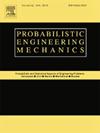An adaptive Kriging-based method for reliability analysis with a new learning strategy
IF 3.5
3区 工程技术
Q2 ENGINEERING, MECHANICAL
引用次数: 0
Abstract
This study proposes a novel active learning-based method for reliability analysis, termed AK-EIG-ESC. The method integrates the adaptive Kriging metamodel with Monte Carlo simulation to estimate the probability of failure and, most importantly, introduces a novel active learning strategy to guide the selection of training samples. To achieve this, a random variable associated with the probability of failure is introduced and demonstrated to follow a Gaussian distribution according to the Central Limit Theorem. Building on this formulation, a new learning strategy is designed by quantifying the expected information gain from a hypothetical experiment. The information gain is expressed as the Kullback-Leibler divergence between the prior and posterior distributions of the introduced random variable associated with the probability of failure. Following this active learning strategy, a sequential sampling scheme is used to actively select new training samples, and the Kriging model is adaptively updated after each new sample is acquired. An error-based stopping criterion is adopted to evaluate the convergence of the proposed algorithm. Several illustrative examples are then used to assess the proposed AK-EIG-ESC algorithm, and the results show that the proposed algorithm exhibits high accuracy and efficiency for reliability analysis.
基于kriging的自适应可靠性分析方法及新的学习策略
本研究提出了一种新的基于主动学习的可靠性分析方法,称为ak - eg - esc。该方法将自适应Kriging元模型与蒙特卡罗模拟相结合来估计故障概率,最重要的是引入了一种新的主动学习策略来指导训练样本的选择。为了实现这一点,引入了一个与故障概率相关的随机变量,并根据中心极限定理证明它遵循高斯分布。在此基础上,设计了一种新的学习策略,通过量化从假设实验中获得的预期信息。信息增益表示为引入的随机变量的先验和后验分布与失效概率相关的Kullback-Leibler散度。根据这种主动学习策略,采用顺序采样方案主动选择新的训练样本,并在每个新样本获得后自适应更新Kriging模型。采用基于误差的停止准则来评价算法的收敛性。通过算例对ak - egg - esc算法进行了验证,结果表明该算法具有较高的可靠性分析精度和效率。
本文章由计算机程序翻译,如有差异,请以英文原文为准。
求助全文
约1分钟内获得全文
求助全文
来源期刊

Probabilistic Engineering Mechanics
工程技术-工程:机械
CiteScore
3.80
自引率
15.40%
发文量
98
审稿时长
13.5 months
期刊介绍:
This journal provides a forum for scholarly work dealing primarily with probabilistic and statistical approaches to contemporary solid/structural and fluid mechanics problems encountered in diverse technical disciplines such as aerospace, civil, marine, mechanical, and nuclear engineering. The journal aims to maintain a healthy balance between general solution techniques and problem-specific results, encouraging a fruitful exchange of ideas among disparate engineering specialities.
 求助内容:
求助内容: 应助结果提醒方式:
应助结果提醒方式:


